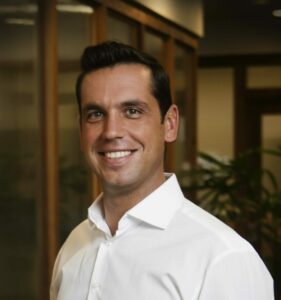Every Angeleno who drives around town knows the frustration of trying to navigate through or around construction delays caused by crews ripping up streets. Chances are, some of the electronic message signs, traffic cones, and those “stop” and “slow” signs held by construction crew members are brought to you by Traffic Management Inc., a Long Beach firm founded by brothers Jonathan and Christopher Spano when both were teenagers. The firm has grown to nearly 3,000 employees with operations in 13 states stretching from coast to coast, and is No. 10 on our List of Minority Owned Businesses. Jonathan Spano, Traffic Management’s chief executive, answered some questions about the challenges and opportunities of being a minority business owner.
Tell us how you got your business started?
My brother Chris and I started Traffic Management, Inc. in the early 1990s in our great grandmother’s garage in Long Beach. It was a family affair for a while, but between Chris’ technology skills and my entrepreneurial ambition, we were able to maintain sustainable growth before things started to really take off in the early 2000s.

Do you like being your own boss?
Yes, I absolutely like being my own boss. I’m a pretty ambitious person, and it allows me to achieve all my goals and visions the way I see them. At this point, I don’t think I could ever think of trading it all in for a steady paycheck. I have too much responsibility now. I owe it to my thousands of employees to guarantee that they have a steady paycheck. We’ve created all this from nothing and now we have people that depend on us. It’s definitely a rewarding feeling.
What’s the best aspect of running your own business?
Running your own business gives a great sense of satisfaction. It feels good knowing that all our hard work and creative ideas have led to this business that continuously makes a positive impact in the communities we serve each day. We create safety for those communities, and we’re able to innovate the way the industry prioritizes safety at every job site with our unique business model.
And the worst?
Maybe not the worst part of running your own business, but something I didn’t realize nearly 30 years ago when we first started is that this is a constant commitment to accountability and stability. Having nearly 3,000 employees depend on you for their livelihood, having countless civilians and work crews depend on our safety services is an incredible responsibility. TMI’s core function is to make sure folks get home safe every day.
What advice would you give someone who’s about to start their own business?
The biggest piece of advice I would give: Do your homework! We were only able to do as well as we did because we knew what we were getting ourselves into. You need to have a solid plan and know your competitive environment. Make sure your business model is sustainable long term by setting measurable goals.
Any other advice?
Be prepared for anything and be flexible! You’ll never be able to predict every speed bump along the way, but if you know your industry and can adapt to anything, then you’ll be able to grow sustainably. Starting your own business may sound glamourous, but be ready to work three times as hard for half as much.
What’s the biggest challenge your business has faced? And how did you deal with it?
The biggest challenge we ever faced was the 2008 financial crisis. We had never been through anything like that before and we weren’t exactly prepared. We kept thinking, “It will get better next month,” and it didn’t work like that. It took almost two years before we were on solid ground again.
Has being a minority affected your business, either in terms of being able to obtain funding/raise capital or to “get your foot in the door” to get contracts or other work?
In the beginning we did not see ourselves as a minority business. It was not until many years in did we even know what that was. It has not helped us raise capital in any way. However, it did open doors for us when we were much smaller. The state actually has a robust supplier diversity program that got us some positive attention. You still need to bid on the project, win it and prove you can do the work, but these programs got us in the room where these conversations were being had.
— Howard Fine
